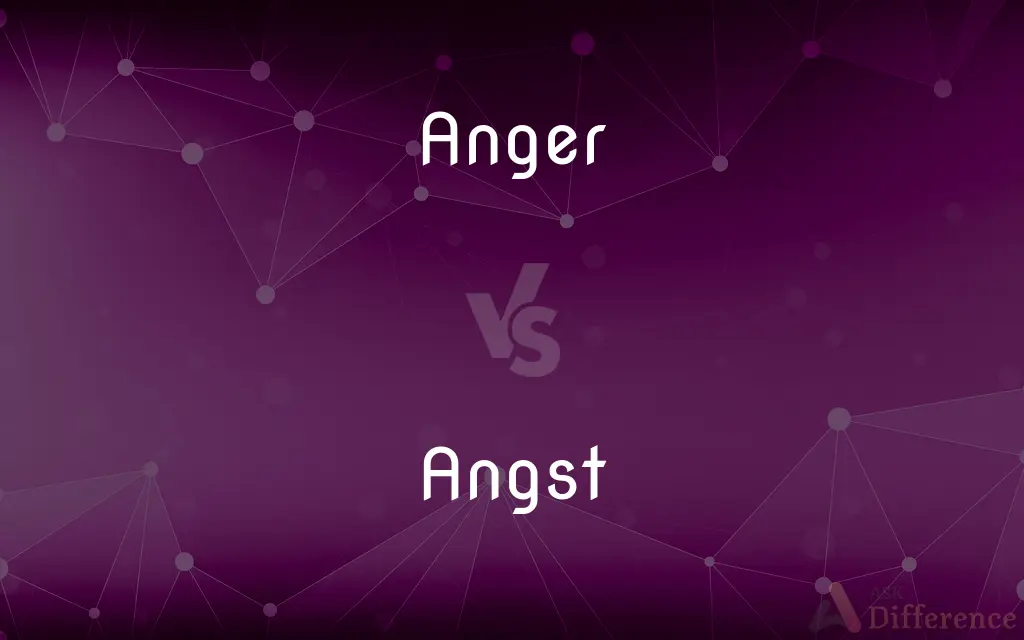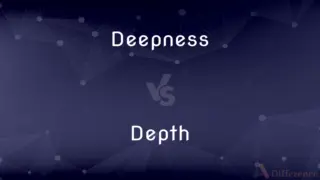Anger vs. Angst — What's the Difference?
By Maham Liaqat & Fiza Rafique — Updated on March 28, 2024
Anger is an intense emotional response to perceived provocation or injustice, often characterized by feelings of annoyance or hostility, while angst is a deep, prolonged existential anxiety or dread concerning the human condition or the state of world.

Difference Between Anger and Angst
Table of Contents
ADVERTISEMENT
Key Differences
Anger is a powerful emotional state resulting from specific instances that cause irritation, frustration, or harm, leading individuals to react defensively or aggressively. It's a natural, though sometimes uncontrollable, response to perceived threats, injustices, or frustrations, manifesting both physically and mentally. In contrast, angst encompasses a broader, more philosophical sense of unease or anxiety about meaningful life questions, the future, or existential concerns, lacking a specific provocation like that typically triggering anger.
While anger can be directed towards specific individuals, situations, or objects and is often expressed through outward aggression or internal turmoil, angst is more about an inward feeling of dread or apprehension without a clear object or focus. Angst deals with overarching existential issues—such as the meaning of life, fear of death, or concerns about freedom making it a more abstract and often more enduring state than the relatively transient and situation-specific nature of anger.
The expression of anger can lead to immediate, visible outcomes, such as confrontational behavior, arguments, or even physical altercations, serving as a catalyst for change or resolution in some cases. Angst, however, tends to manifest through prolonged periods of reflection, melancholy, or existential questioning, and its resolution often requires philosophical contemplation, self-reflection, or therapeutic intervention, rather than direct action against a specific antagonist.
Anger is considered a basic human emotion, experienced universally across cultures, and can have adaptive functions, such as signaling social injustice or motivating individuals to address wrongs. Angst, on the other hand, might be more prevalent in certain cultural or intellectual contexts and is often associated with the philosophical and existential contemplations arising from modern or postmodern existentialist thought.
Despite their differences, both anger and angst are significant emotional states that influence human behavior, decision-making, and well-being. While anger prompts an immediate response to specific situations, angst involves a deeper, more existential wrestling with life's inherent uncertainties and complexities, each requiring different approaches to understanding and management.
ADVERTISEMENT
Comparison Chart
Definition
Intense emotional response to provocation or injustice
Deep existential anxiety or dread
Trigger
Specific instances of irritation, frustration, or harm
Broad existential concerns without a specific provocation
Expression
Outward aggression or internal turmoil
Prolonged reflection or melancholy
Resolution
Direct action or confrontation
Philosophical contemplation or therapeutic intervention
Function
Signals injustice, motivates change
Invokes existential questioning, self-reflection
Compare with Definitions
Anger
Can be expressed through verbal outbursts or physical reactions.
His anger manifested in a loud, confrontational argument.
Angst
A feeling of deep anxiety or dread, typically about the human condition or the state of the world.
He experienced a sense of angst about his future prospects.
Anger
Often triggered by specific instances of perceived wrongs.
The unfair treatment at work sparked anger among employees.
Angst
Exhibits as a pervasive sense of unease or restlessness.
Her angst was reflected in her art, full of existential themes.
Anger
Serves to highlight injustice and can motivate corrective action.
Anger over the policy led to significant social protest.
Angst
Reflects deep contemplation about life's uncertainties and complexities.
Philosophical discussions about freedom and responsibility can evoke angst.
Anger
Managed through techniques like communication and stress relief.
She attended anger management classes to control her temper.
Angst
Stemming from existential questions or philosophical concerns.
The existential angst of modern society often revolves around finding meaning in life.
Anger
A strong feeling of annoyance, displeasure, or hostility.
She felt a surge of anger when she was unfairly criticized.
Angst
Often addressed through existential reflection and therapy.
Reading existential literature helped him navigate his feelings of angst.
Anger
A strong feeling of annoyance, displeasure, or hostility
The colonel's anger at his daughter's disobedience
Angst
Angst means fear or anxiety (anguish is its Latinate equivalent, and the words anxious and anxiety are of similar origin). The dictionary definition for angst is a feeling of anxiety, apprehension, or insecurity.
Anger
Fill (someone) with anger; provoke anger in
He was angered that he had not been told
She was angered by his terse answer
Angst
A feeling of anxiety, apprehension, or dread.
Anger
A strong feeling of displeasure or hostility.
Angst
To show or feel anxiety, apprehension, or dread
Angsted over the upcoming exam.
Anger
To make angry; enrage or provoke.
Angst
Emotional turmoil; painful sadness.
Anger
To become angry
She angers too quickly.
Angst
A feeling of acute but vague anxiety or apprehension often accompanied by depression, especially philosophical anxiety.
Anger
A strong feeling of displeasure, hostility or antagonism towards someone or something, usually combined with an urge to harm, often stemming from perceived provocation, hurt, or threat.
You need to control your anger.
Angst
To suffer angst; to fret.
Anger
(obsolete) Pain or stinging.
Angst
An acute but unspecific feeling of anxiety; usually reserved for philosophical anxiety about the world or about personal freedom
Anger
(transitive) To cause such a feeling of antagonism in.
He who angers you conquers you.
Anger
(intransitive) To become angry.
You anger too easily.
Anger
Trouble; vexation; also, physical pain or smart of a sore, etc.
I made the experiment, setting the moxa where . . . the greatest anger and soreness still continued.
Anger
A strong passion or emotion of displeasure or antagonism, excited by a real or supposed injury or insult to one's self or others, or by the intent to do such injury.
Anger is likeA full hot horse, who being allowed his way,Self-mettle tires him.
Anger
To make painful; to cause to smart; to inflame.
He . . . angereth malign ulcers.
Anger
To excite to anger; to enrage; to provoke.
Taxes and impositions . . . which rather angered than grieved the people.
Anger
A strong emotion; a feeling that is oriented toward some real or supposed grievance
Anger
The state of being angry
Anger
Belligerence aroused by a real or supposed wrong (personified as one of the deadly sins)
Anger
Make angry;
The news angered him
Anger
Become angry;
He angers easily
Common Curiosities
How do people express angst?
Through art, literature, philosophical discourse, and personal reflection.
Is angst a modern phenomenon?
While angst has been discussed extensively in modern philosophy, existential concerns are timeless.
Can anger be positive?
Yes, when it motivates constructive change or highlights social injustices.
What role does culture play in anger and angst?
Cultural norms and values can influence the expression and acceptance of both emotions.
What is the first step in managing anger?
Recognizing triggers and acknowledging the emotion itself.
Can existential angst be resolved?
It can be managed or mitigated through philosophical understanding, acceptance, and therapy.
How does anger affect health?
Chronic anger can have negative impacts on mental and physical health.
What causes anger?
Anger is caused by perceived provocations, injustices, or frustrations.
How is angst different from general anxiety?
Angst is specifically related to existential concerns and the human condition, whereas general anxiety can be about more immediate or specific fears.
Does everyone experience angst?
To some degree, many people grapple with existential questions, though the intensity can vary.
Are there specific therapies for managing angst?
Existential therapy and other forms of psychotherapy can address angst.
Is anger always directed at someone or something?
Typically, yes, anger usually has a direct object or cause.
Can angst lead to creativity?
Yes, it often inspires artistic and literary expression.
Can understanding existential philosophy reduce angst?
For some, it provides a framework to understand and navigate existential concerns, potentially reducing angst.
How can societal changes influence feelings of angst?
Societal shifts can exacerbate existential concerns by altering our sense of stability and purpose.
Share Your Discovery

Previous Comparison
Equivocal vs. Unequivocal
Next Comparison
Deepness vs. DepthAuthor Spotlight
Written by
Maham LiaqatCo-written by
Fiza RafiqueFiza Rafique is a skilled content writer at AskDifference.com, where she meticulously refines and enhances written pieces. Drawing from her vast editorial expertise, Fiza ensures clarity, accuracy, and precision in every article. Passionate about language, she continually seeks to elevate the quality of content for readers worldwide.
















































